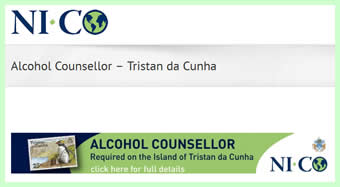Norwegian sociologist Peter Munch noticed during his fieldwork on Tristan da Cunha in 1937–38 that the Islanders consumed no alcohol. The reason, he wrote in his book The Sociology of Tristan da Cunha (1945), was that they “attach much importance to dignity in every situation (p.68).”
As a result, they not only would not consume any alcohol on the island, they wouldn’t even take a drink if offered one on a visiting ship. Munch did suspect that most of the men had tasted alcohol once or twice, but nonetheless they attached a lot of value to not “losing control of their conduct”—i.e., to always maintaining their peacefulness.

But times and conditions have changed. Much more recently, Conrad Glass (2011) writes that alcohol is now accepted on Tristan. He decries the “casual acceptance” (p.141) of alcohol nowadays—it is an important aspect of the Tristan way of life. Evidently, problems have become severe enough that a position was advertised last week for a professional counsellor who can work with the Islanders on controlling alcohol abuse.
The position, Alcohol Counselor, has been listed in the website of the organization Northern Ireland Co-operation Overseas (NICO). It seeks experienced candidates willing to work with the Islanders for a period of at least six months.
NICO is “a not for profit, public body dedicated to the pursuit of building efficient, accountable and sustainable public sector institutions capable of managing donor aid effectively and implementing positive change,” according to the website. The Alcohol Counsellor is clearly expected to work for positive changes on Tristan.
The story was picked up on Wednesday last week by the news site Belfastlive, then on Thursday by the Mirror, the website of the Daily Mirror, a major British tabloid. The best information, however, is found on the job posting itself, on the NICO website. It indicates that candidates, who would begin their service on Tristan in September 2015, would need to have the appropriate professional counselling qualifications and certification, and would need to have at least 10 years experience handling alcohol dependency and abuse problems.
The principle objective of the new position is “to provide counseling services to those impacted by alcohol abuse/dependency related issue within the island population.” The preferred applicant should be able to commit to the post for six months on the island, but if not, a candidate who can commit to a shorter period of time, with a follow-up revisit later, would be considered.
An important aspect of providing counselling services will be for the Alcohol Counsellor to develop trust with the 270 Tristan Islanders in order to engage with individuals who may benefit from professional support. The successful candidate will need to provide an environment where families and individuals can review alcohol related issues. The counsellor should seek to educate the people about alcohol and health problems. He or she will work with the resident doctor on health related messages.
The ad is quite frank in its assessment of the working conditions: “This job will be challenging and demanding as you will often be working on your own as the sole provider of counselling services on the Island. Irregular or longer than usual working hours are to be expected.”
Salary will be £24,000 to £32,000 per year, depending on experience. The successful applicant will be expected to ship out of Cape Town on or about September 3, 2015, for Tristan, and will be returning to the city on or about March 2, 2016.
The position announcement includes a very detailed statement of the health policy of the Government of Tristan da Cunha. Among the many background details it provides is the following description of the issue on the island: “As in the rest of the world, alcohol consumption is high and it is important to provide the necessary literature to educate the community to the health and social implications of alcohol abuse. The lack of other activities and sport facilities does not leave the community with much else to do than to socialise.”
The Tristan Islanders are not alone among the peaceful societies in recognizing the potentially harmful effects of alcohol consumption in a society that has not used it previously. A news story in May 2014 reported on the apparently successful attempts of a Yanadi community to minimize drinking. Another, in May 2011, reported on problem drinking in a Kadar community. There have been numerous others, though the Tristan approach of hiring a professional counselor to live for a while in a remote, small-scale peaceful society appears to be unique.